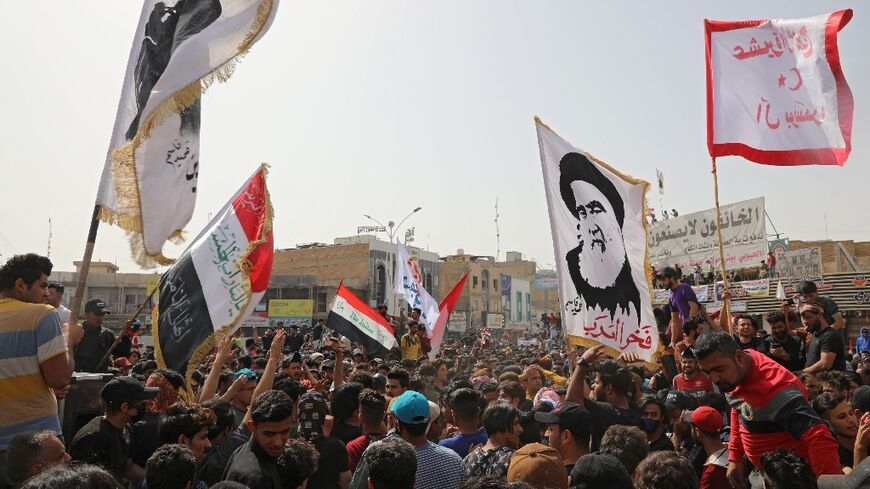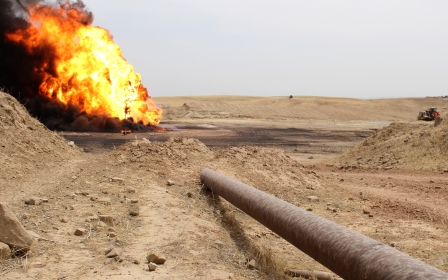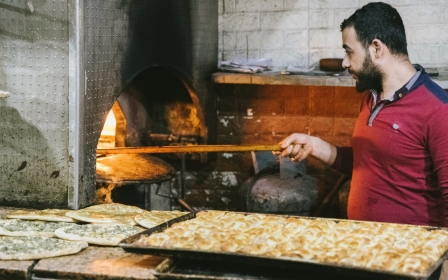Cost-of-living crisis in Middle East likely to mean further 'repression'

An unprecedented rise in food and energy costs compounded by the climate crisis is resulting in a perfect storm for civil unrest in more than 100 countries, according to newly released analysis.
Popular anger at cost-of-living crises has seen the Sri Lankan government toppled, protests in Argentina and rising discontent in Europe.
The report, produced by risk analysis firm Verisk Maplecroft, warns that political turmoil in the next 12 months is set to increase, with over 80 percent of countries experiencing inflation above six percent and the prospect of repressive measures being used to quell dissent likely.
Countries in the Middle East and North Africa are particularly exposed to these rising threats, with three of the top 10 most at-risk being from the region.
New MEE newsletter: Jerusalem Dispatch
Sign up to get the latest insights and analysis on Israel-Palestine, alongside Turkey Unpacked and other MEE newsletters
'Across the region, political leaders will be acutely aware that this spike played an important part in the wave of uprisings during the Arab Spring'
- Torbjorn Soltvedt, principal analyst
Egypt, Lebanon and Tunisia were already in the throes of an economic and political crisis before the latest shock, which resulted from Russia's invasion of Ukraine in February this year.
"Global food prices have risen significantly above the previous peak in December 2010," said Torbjorn Soltvedt, principal analyst at Verisk Maplecroft.
"Across the [MENA] region, political leaders will be acutely aware that this spike played an important part in fuelling the wave of uprisings across the region during the Arab Spring."
A combination of pandemic stimulus packages and supply chain disruptions caused by China's zero-tolerance policy for Covid-19 has only added to the pain faced by citizens across the Middle East as inflation has surged.
Unlike high-income economies, where governments have cushioned some of the pain for their citizens, low and middle-income countries are likely to bear the brunt.
But the Middle East is not being affected equally, Soltvedt told Middle East Eye, separating the region into three risk categories.
"At the most fragile end of the spectrum, Lebanon, Turkey and Iran are already in hyperinflation territory," he said, adding that "Jordan, Tunisia, Algeria, Egypt, Iraq, and Morocco sit in a middle category, where rising unemployment and inflation increase the risk of greater civil unrest.
"Only the Gulf Cooperation Council [GCC] states and Israel appear well equipped to mitigate growing socio-economic pressure," Soltvedt said.
Record energy prices have been a boon for the GCC countries, which rely on oil and gas exports as their main source of income.
While Israel has a more diversified economy, it has also benefited from higher energy prices, with exports of gas to Europe drastically increasing.
"For the governments that cannot spend their way out of the crisis, suppression through force will be the main response to growing unrest," Soltvedt told MEE.
Such is the sensitivity around discussion of the economic state of the region that when a prominent Egyptian journalist wrote about "the 14 reasons" authoritarian governments fail in Arab countries, he drew an angry response from Cairo.
Soltvedt, however, warns that the use of force to quell rising protests "risks worsening an existing crisis of legitimacy".
"A common theme in many countries across the region is that there are now very few effective mechanisms for channelling popular discontent at a time when dissatisfaction with the economic and political status quo is growing," he said.
Arab Spring repeat
During the wave of protests that came to be known as the Arab Spring, the rallying cry of millions was "bread, freedom and social justice".
More than a decade later, these countries are still just as vulnerable to widespread social unrest, said Hamish Kinnear, Middle East and North Africa analyst at Verisk Maplecroft.
Kinnear told MEE that Tunisia, Egypt, Morocco and Lebanon depend on food and fuel imports, "meaning that both are exposed to high international prices".
Energy and food subsidies in these countries "mean these are more of a fiscal drain than in the past," Kinnear said.
He warned that Tunisia, widely seen as the epicentre of the Arab Spring, "is more vulnerable to civil unrest risk".
After a referendum vote on Tunisia's new constitution in July, plagued by a low turnout and a boycott from opposition groups, President Kais Saied consolidated his one-man rule, rolling back the country's democratic experiment.
"Political chaos [in Tunisia] is hampering efforts to secure economic aid from international financial institutions like the IMF, though any deal with the IMF is likely to include austerity measures that provoke further civil unrest," said Kinnear.
Despite being, relatively speaking, more politically stable, Egypt has similar economic problems, said Kinnear.
Egyptian President Abdel Fattah el-Sisi can also "marshal external financial support faster, particularly from petrodollar rich countries in the Gulf that are friendly".
While across the region a continuation of high food and energy prices is likely to increase the chance of political unrest, "instability on the scale of the Arab Spring is unlikely, however, as most governments are comfortable using repressive measures to prevent civil unrest from growing to unmanageable proportions," said Kinnear.
Middle East Eye delivers independent and unrivalled coverage and analysis of the Middle East, North Africa and beyond. To learn more about republishing this content and the associated fees, please fill out this form. More about MEE can be found here.





